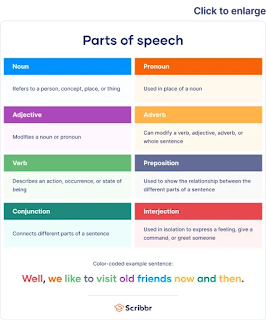It seems like you want some information or guidance about English grammar. Here's a brief overview of some fundamental aspects of English grammar:
1. **Parts of Speech**:
- **Nouns**: Words that name people, places, things, or ideas (e.g., cat, London, happiness).
- **Pronouns**: Words that take the place of nouns (e.g., he, she, it).
- **Verbs**: Words that express actions or states of being (e.g., run, is).
- **Adjectives**: Words that describe nouns (e.g., happy, large).
- **Adverbs**: Words that modify verbs, adjectives, or other adverbs (e.g., quickly, very).
- **Prepositions**: Words that show relationships between nouns or pronouns and other words in a sentence (e.g., in, on, at).
- **Conjunctions**: Words that connect words, phrases, or clauses (e.g., and, but, because).
- **Interjections**: Words or phrases that express strong emotion (e.g., wow, ouch).
2. **Sentence Structure**:
- **Subject**: The person, place, thing, or idea that is doing or being something (e.g., "The cat").
- **Predicate**: The part of the sentence that tells what the subject does or is (e.g., "is sleeping").
- **Object**: The entity that is acted upon by the subject (e.g., "She reads a book").
3. **Tenses**:
- **Present Tense**: Describes actions happening now (e.g., "I walk").
- **Past Tense**: Describes actions that happened in the past (e.g., "I walked").
- **Future Tense**: Describes actions that will happen (e.g., "I will walk").
- **Continuous Tense**: Describes ongoing actions (e.g., "I am walking").
- **Perfect Tense**: Describes completed actions (e.g., "I have walked").
4. **Sentence Types**:
- **Declarative**: Makes a statement (e.g., "The sky is blue.").
- **Interrogative**: Asks a question (e.g., "Is the sky blue?").
- **Imperative**: Gives a command (e.g., "Close the door.").
- **Exclamatory**: Expresses strong emotion (e.g., "What a beautiful day!").
5. **Punctuation**:
- **Period (.)**: Ends a declarative sentence.
- **Comma (,)**: Separates elements in a list, clauses, or introduces pauses.
- **Question Mark (?)**: Ends a question.
- **Exclamation Point (!)**: Ends an exclamatory sentence or expresses strong emotion.
- **Apostrophe (')**: Shows possession (e.g., John's book) or forms contractions (e.g., can't).
- **Quotation Marks ("")**: Enclose direct speech or quotations.
6. **Common Grammar Rules**:
- **Subject-Verb Agreement**: The subject and verb must agree in number (e.g., "She walks" vs. "They walk").
- **Proper Use of Articles**: "A" and "an" are used with singular, countable nouns; "the" is used for specific nouns.
7. **Modifiers**: Words or phrases that add detail or clarify meaning (e.g., adjectives and adverbs).
If you need more detailed explanations or have specific questions about English grammar, feel free to ask!
.jpeg)

.jpeg)
.jpeg)

.jpeg)

.jpeg)
Comments
Post a Comment